Monsanto has been the target of activists for years. One group, March Against Monsanto was birthed from the Occupy Wall St. movement in New York City. March Against Monsanto held its third annual march in New York City on May 23rd, 2015. The group wants to stop “Monsanto’s corrupt activities and damage to life on our planet.” Events took place in 428 cities, across 6 continents, 52 countries, and 47 U.S. States and included tens of thousands of participants in an effort to mobilize and educate the public against the Monsanto Company.
Monsanto Company is an American multinational agrochemical and agricultural biotechnology corporation founded in 1901 in St. Louis, Missouri.
 Monsanto has been criticized for manufacturing the herbicide Agent Orange for use by the United States government in the Vietnam War. In the 1990s, Monsanto introduced a recombinant bovine growth hormone, a dairy cow hormone approved by the Environmental Protection Agency for commercial sale in 1994. Since then, Monsanto has sued dairy companies, including the famously progressive ice cream company Ben & Jerry’s, for advertising their products as being free from the artificial hormone. Bovine growth hormone increases milk output from 11-16 percent. Two meta-analyses by Canadian Veterinary Medical Association indicate that cows also saw a 25 percent increase in the risk of mastitis, a 40 percent reduction in fertility, and a 55 percent increased risk in developing signs of lameness. In 1994, a European Union scientific commission stated that the use of the hormone substantially increased health problems for cows, also including foot problems and reactions at injection sites, though there was no evidence of harmful health risks to humans.
Monsanto has been criticized for manufacturing the herbicide Agent Orange for use by the United States government in the Vietnam War. In the 1990s, Monsanto introduced a recombinant bovine growth hormone, a dairy cow hormone approved by the Environmental Protection Agency for commercial sale in 1994. Since then, Monsanto has sued dairy companies, including the famously progressive ice cream company Ben & Jerry’s, for advertising their products as being free from the artificial hormone. Bovine growth hormone increases milk output from 11-16 percent. Two meta-analyses by Canadian Veterinary Medical Association indicate that cows also saw a 25 percent increase in the risk of mastitis, a 40 percent reduction in fertility, and a 55 percent increased risk in developing signs of lameness. In 1994, a European Union scientific commission stated that the use of the hormone substantially increased health problems for cows, also including foot problems and reactions at injection sites, though there was no evidence of harmful health risks to humans.
Later, Monsanto began buying seed companies and became the world’s largest-grossing seed company. Now, they are known for using two different kinds of genetic modification, called Bt and Roundup Ready. Bt, or bacillus thuringiensis, refers to a crop that is modified to itself produce a built-in insecticide, killing insects by dissolving their gut lining. Roundup Ready refers to crops that are engineered to be resistant to Roundup, Monsanto’s prominent weed-killer. Recently, the Environmental Protection Agency (EPA), established an exemption from the requirement of a tolerance for residues Bt in or on soybean, after a petition for the exemption had been submitted from Monsanto. The EPA’s decision means that no maximum permissible level of Bt residues need be established for Monsanto’s soybean. Dow AgroSciences is also a producer of Bt soybeans.
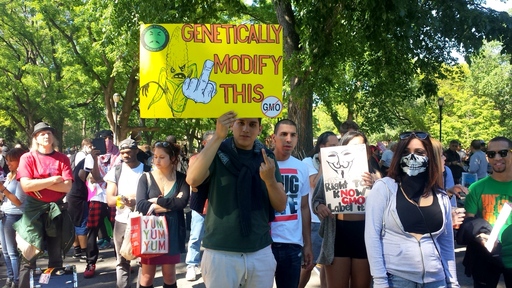 Today, the company is famous for its questionable business practices and the potential risk their products pose to consumers and the environment. Monsanto was listed as the fourth most hated corporation in a poll conducted by the market research firm Harris Poll, reported Bloomberg Business. “People need to understand that there are other companies, Bayer, Dow, Syngenta that play the same kind of game that Monsanto does when it comes to agriculture,” Michael Basillas, one of the organizers from March Against Monsanto, told La VOCE.
Today, the company is famous for its questionable business practices and the potential risk their products pose to consumers and the environment. Monsanto was listed as the fourth most hated corporation in a poll conducted by the market research firm Harris Poll, reported Bloomberg Business. “People need to understand that there are other companies, Bayer, Dow, Syngenta that play the same kind of game that Monsanto does when it comes to agriculture,” Michael Basillas, one of the organizers from March Against Monsanto, told La VOCE.
In New York City, marchers lined up around noon at Dag Hammarskjold Plaza on East 47th Street, setting the tone of community building in the first hour of events. The march, which was permitted by the city of New York, lasted for roughly two hours and traveled to Union Square and then Tompkins Square Park, culminating in a rally featuring speeches and performances.
“A lot of parents come to the March,” Basillas said, “I think they’re very concerned about what they’re putting in their food for their kids. We have support from a lot of activist groups. Times Up shows support, Food and Water Watch, and Kitchen of Responsibility too. Local organic farmers are the soldiers of the movement. We also have a lot of support from those farmers, farmers that are experiencing agricultural bullying, where they’re getting sued because the patented seeds of Monsanto are blowing onto their land and Monsanto claims they’re stealing.”
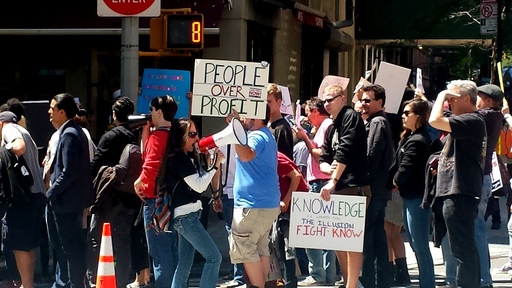

Food Not Bombs at Tompkins Square Park
Marchers chanted “Fuck No / GMO” and “Let’s go Farmers” as they went, restricted to the bus lane. When they arrived at Tompkins Square Park, the Lower Manhattan chapter of the loose-knit group of independent collectives called Food Not Bombs had set up several tables with freegan (free-vegan) meals to feed the marchers. Food Not Bombs’ ideology revolves around the belief that corporate and government priorities are skewed to allow hunger to persist in the midst of abundance. Therefore, the food served is surplus from grocery stores, bakeries, and markets that would otherwise be discarded.
The first performance at Tompkins Square Park was a country song called Roundup Blues. The band, The Special Interests, introduced it as a song “About a farmer who found out the hard way.”
Roundup is the world’s most widely used weed-killer. The World Health Organization’s (WHO) cancer agency, The International Agency for Research on Cancer (IARC), has recently said that glyphosate, the active ingredient in Roundup was “classified as probably carcinogenic to humans.” Philip Miller, Monsanto’s vice-president of global regulatory affairs, said in an official statement, “We don’t know how IARC could reach a conclusion that is such a dramatic departure from the conclusion reached by all regulatory agencies around the globe.”
The United States still considers the herbicide to be safe, and Geological Survey data indicates that use of glyphosate has increased 16-fold since 1990s when GM crops were introduced to the market. In 2013, Monsanto successfully requested approval from the Environmental Protection Agency for increased tolerance levels for glyphosate. Glyphosate’s approval status in the European Union will expire at the end of 2015 (the ten year approval should have ended in 2012. In 2010, Monsanto asked for a renewal and following the application, the Commission extended glyphosate’s approval until 2015).
 In the park, Steve Druker, author of the book "Altered Genes, Twisted Truth", accused Monsanto “and its allies” of disinformation by subverting science, corrupting government, and systematically deceiving the public. “Our laws have been violated,” he said to the crowd. Druker plans to tour with Rock and Roll Hall of Fame inductee Neil Young for his upcoming album The Monsanto Years.
In the park, Steve Druker, author of the book "Altered Genes, Twisted Truth", accused Monsanto “and its allies” of disinformation by subverting science, corrupting government, and systematically deceiving the public. “Our laws have been violated,” he said to the crowd. Druker plans to tour with Rock and Roll Hall of Fame inductee Neil Young for his upcoming album The Monsanto Years.
Also in attendance were representatives of Food and Water Watch, “a non-profit organization that advocates for common sense policies that will result in healthy, safe food and access to safe and affordable drinking water,” and Jeffrey Smith, international bestselling author and GMO expert, and the founder an sole employee of The Institute for Responsible Technology.
Speakers decried the revolving door that Monsanto shares with the United States government. “We have a separation of church and state, but we do not have a separation of government and corporations.” Basillas said to La VOCE.
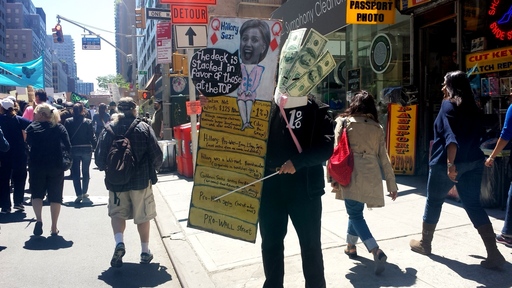 A number of politicians have been linked to Monsanto. Toby Moffett was a U.S. Congressman who later took a job with Monsanto. Josh King served as Director of Production for Presidential Events and later took a job with Monsanto. Linda Fisher has held a number of positions within the EPA and has also worked as Vice President of Governmental Affairs for Monsanto. Michael Taylor, a former Monsanto executive, joined the FDA as a senior advisor and executive assistant to the commissioner. He left the FDA for a law firm where he worked to secure approval for Monsanto’s Bovine Growth Hormone before returning to the FDA as deputy commissioner. Supreme Court Judge Clarence Thomas also worked for Monsanto. There have also been allegations that Hillary Clinton worked on the Monsanto counsel during her time at the Rose Law Firm.
A number of politicians have been linked to Monsanto. Toby Moffett was a U.S. Congressman who later took a job with Monsanto. Josh King served as Director of Production for Presidential Events and later took a job with Monsanto. Linda Fisher has held a number of positions within the EPA and has also worked as Vice President of Governmental Affairs for Monsanto. Michael Taylor, a former Monsanto executive, joined the FDA as a senior advisor and executive assistant to the commissioner. He left the FDA for a law firm where he worked to secure approval for Monsanto’s Bovine Growth Hormone before returning to the FDA as deputy commissioner. Supreme Court Judge Clarence Thomas also worked for Monsanto. There have also been allegations that Hillary Clinton worked on the Monsanto counsel during her time at the Rose Law Firm.
Speakers also emphasized Bill A.617 in Albany, New York, which would mandate labeling of GMO products in the state of New York. “We have four weeks to move the bill to the floor for a vote,” one speaker said.
“Whether we are supporting labeling groups or marching in the streets, we created an opportunity for the community to plug in. I don’t think labeling is the only solution, though. We got to do them all.” Basillas said to La VOCE.
Although polls conducted by major news organizations show that over 90 percent of respondents favor national labeling of GMO products, Vermont is the only state on track to require GMO labelling. A lawsuit was filed against the state of Vermont over the decision by the Grocery Manufacturers Association (GMA), a trade association representing the world’s largest branded food, beverage and consumer product companies, including: Monsanto Company, Dow AgroSciences, The Coca-Cola Company, Del Monte Foods, Dole Packaged Foods Company, General Mills, Inc., The Hershey Company, Kellogg Company, Kraft Foods Group, McDonald's Corporation, Nestlé USA, Inc., Ocean Spray Cranberries, Inc., PepsiCo, Inc., Starbucks Coffee Company, Target Corporation, and Welch Foods, Inc.
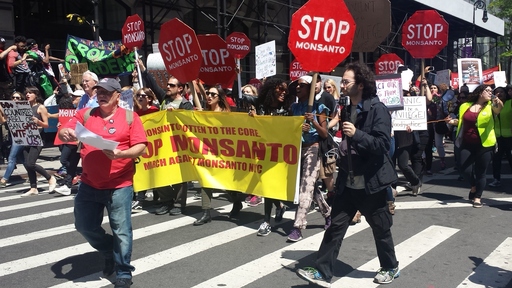
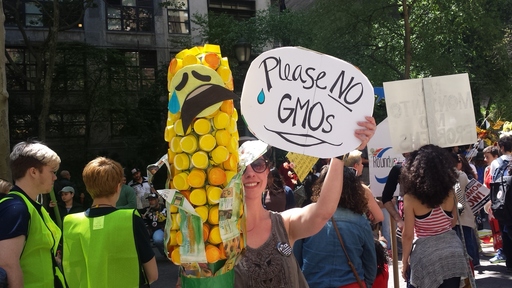 GMA argued in an official statement that manufacturers were being harmed by “unconstitutional” and “burdensome new speech requirements on food manufacturers and retailers.” The court however, ruled in favor of Vermont. Ronnie Cummins, international director of The Organic Consumer Association, said, “This landmark ruling not only paves the way for Vermont’s GMO labeling law to take effect on schedule, July 1, 2016, but more importantly it signals that the courts agree that states have a constitutional right to pass GMO labeling laws.” The bill will likely serve as a framework for other states to implement labeling laws.
GMA argued in an official statement that manufacturers were being harmed by “unconstitutional” and “burdensome new speech requirements on food manufacturers and retailers.” The court however, ruled in favor of Vermont. Ronnie Cummins, international director of The Organic Consumer Association, said, “This landmark ruling not only paves the way for Vermont’s GMO labeling law to take effect on schedule, July 1, 2016, but more importantly it signals that the courts agree that states have a constitutional right to pass GMO labeling laws.” The bill will likely serve as a framework for other states to implement labeling laws.
“In the public’s eye, they don’t consider GM crops to be bad. There are actually attempts that have been done to do studies. In other places like Europe, there are independent studies that have been done. Our country doesn’t recognize foreign studies. Duke University took an initiative to try to do an independent study, but they got sued by Monsanto because they didn’t ask Monsanto for permission. They are the only people that really know the outcome or the phenomena of GM crops,” Basillas told La VOCE.
Included in the line-up was Adam Weissman, a member of Global Justice for Animals and the Environment and Trade Justice, a grassroots coalition in New York that opposes free trade agreements modeled after the North American Trade Agreement. He referred to the Transatlatic Trade and Investment Partnership (TTIP), a proposed free trade agreement between the U.S. and European Union, as being a “Global Monsanto Protection Act.” He said congress “Fast tracked the fast track process,” and that Trans-Pacific Trade Partnership (TPP) was “stealth legislation.” In fact, it was revealed on May 25 in documents obtained by Pesticides Action Network that EU moves to regulate and possibly ban 31 pesticides containing endocrine disrupting chemicals linked to cancer and male infertility were dropped amid fears of backlash from TTIP industry lobbyists.
“The Monsanto Protection Act is an effort to protect their profits and product through patents and anti-labeling rules” Basillas told La VOCE.
After the speeches, marchers were invited to the community garden La Plaza Cultural and the Museum of Reclaimed Urban Space, nearby Tompkins Square Park in the East Village of Manhattan. The museum runs tours and documents the history of squatting and community gardens in the neighborhood, which has the highest concentration of community gardens in New York City.
At the museum and garden, March Against Monsanto organized a “Free School”, including a three part lecture series. Included in the first part of the series was an interactive discussion around GMO fundamentals, focusing on GM crops role in the decrease of the honey bee and monarch butterfly population.
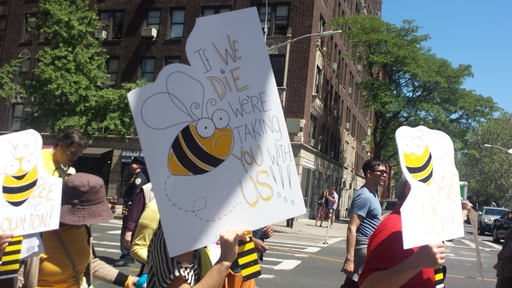
“If the bee disappeared off the surface of the globe, then man would have only four years of life left.” – Albert Einstein
Domestic and wild honey bees are responsible for 80 percent of the world’s pollination, according to a Greenpeace report. One third of what we eat would disappear if the bees did. Yearly, bees’ economic value has been estimated to be more than $289 billion and they pollinate $40 billion of America’s agricultural produce. Many of the foods that make up a nutritious diet are dependent on them, including: vegetables, tree nuts, fruits, spices, edible oils, and berries.
Since the 1990s, beekeepers have observed a mysterious and sudden phenomenon called Colony Collapse Disorder (CCD), defined as a syndrome in which a colony dies almost entirely. Symptoms include no adult bees present, or only their dead bodies, but a living queen, and usually honey and immature bees still present. Since the 1940s, America’s bee population has gone from 5 million to 2.5 million. The rate of bee depopulation grows yearly, with rates recently as high as 42 percent, accounting for annual losses of $30 billion.
The United States has seen a 40 percent loss in commercial honey be population since 2006. Notably, the White House announced a plan to promote the health of honey bees and other pollinators, though the plan falls short on pesticides.
Pesticides are not solely to blame for CCD, scientists suspect that CCD is a result of a combination of many factors, also including environmental stress, parasites, and loss of habitat.
Harvard University research shows that when colonies are exposed to neonicotinoids, or “neonics”, the most popular insecticide worldwide, one half die. Neonicotinoid use has been underestimated in the past, since studies, including governmental studies, did not include seed treatment, a process by which a seed is treated before being planted. At least 79% of American maize fields use this process. Some farmers have trouble finding untreated seeds.
To make matters worse, the Varroa mite was discovered in 1987, and today accounts for a large portion of bee deaths. Monsanto, Dow, and others quickly began selling modified insecticides and pesticides after the discovery in order to fix the parasitic invasions facing bee colonies. Concernes have been raised that these new pesticides ultimately could weaken the bees’ genetic defenses to fight off parasites.
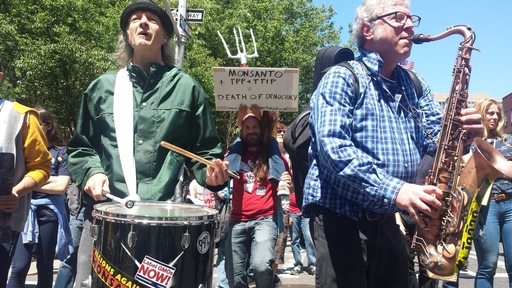 Other lectures at the Free School included a workshop entitled “Cartographic Terrorism, The Violence of Food, and Bringing the Insurgency Home”. It defined Cartographic Terrorism as a way of delegitimizing the state, state-supported institutions, and powerful corporations through maps and ‘countermaps’. Jeffrey Smith ran a workshop “The Latest on GMOs”, which also highlighted an effort by Oxitec Ltd, to introduce genetically modified mosquitos to the Florida Keys, as well as new genetic modification techniques that prevent apples and potatoes from browning.
Other lectures at the Free School included a workshop entitled “Cartographic Terrorism, The Violence of Food, and Bringing the Insurgency Home”. It defined Cartographic Terrorism as a way of delegitimizing the state, state-supported institutions, and powerful corporations through maps and ‘countermaps’. Jeffrey Smith ran a workshop “The Latest on GMOs”, which also highlighted an effort by Oxitec Ltd, to introduce genetically modified mosquitos to the Florida Keys, as well as new genetic modification techniques that prevent apples and potatoes from browning.
Steve Druker’s “Raising Our Sights Beyond Monsanto” posited that all GM crops, not just those engineered to tolerate glyphosate, pose unacceptable risks. The lecture also focused on Monsanto’s relationship with the Food and Drug Administration. Druker said, “The FDA has reversed the burden of proof of the bio technicians and onto consumers under the Reagan administration.” He later told La VOCE that, in his book, there are many instances of the FDA calling in only two expert witnesses to testify on the behalf of GMO safety or lack thereof. He said that Monsanto and their allies are able to “bypass the 1958 Food Additive amendment,” because the FDA does not require notice or testing of products that are “generally recognized as safe.”
“From the standpoint of software engineering, this [genetic modification] isn’t bio engineering; its bio hacking,” Druker said. “If some small, precise surgical change is made by a system creator, unexpected changes can happen elsewhere. Disruptions and mutations of native genes and expressions of foreign genes are the biggest problems.”
“At the end of the day, it’s about working with other communities that already exist and are fighting this issue, and we [March Against Monsanto] would also like to elevate their fight forward.” Basillas said.












